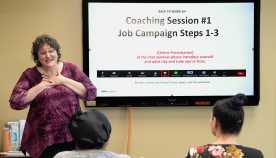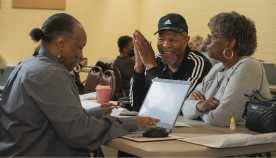About Us

.jpg)
“Right is right, and wrong is wrong,” says Shawn Jones.
He’s known that since he was a boy growing up in the farmland of central Illinois.
Shawn, 53, works for Austin Industrial in Decatur. It’s a job that comes with risks — in the form of tasks that involve high-voltage power cables, operating heavy machinery, and dealing with mechanical systems, all of which exposes him to hazards that could lead to serious injuries and even death.
The risk he didn’t expect was the one to his and his family’s private medical information. That’s a risk that wasn’t inherent to the job, but that Austin was adding to the list.
In 2021, Shawn learned from a company flyer that both he and his wife, as part of the company health plan’s wellness program, had to submit to “biometric screening” — including waist measurements and lab tests for conditions like diabetes — or face a hefty insurance-premium penalty of up to $2,400 that the company called a “non-wellness surcharge.”
“Wait a minute,” said Shawn. “This isn’t adding up.” And he started doing some research.
Shawn soon found out that the American with Disabilities Act (ADA) and the Genetic Information Nondisclosure Act (GINA) require that company wellness programs be entirely voluntary. That potential $2,400 penalty “did not feel like a voluntary situation.”
As Shawn puts it, “Some people who financially could not afford to refuse to participate [in the wellness program] would check the box [saying] they are voluntarily participating because they feel they have no choice but to participate. It’s not because they’re voluntarily participating. It’s because they cannot lose $2,400 a year.”
Shawn’s research also led him to news accounts of AARP Foundation attorneys’ role in a class action lawsuit against Yale University, which was also charging employees a fee for not participating in a wellness program; the case ended in a settlement that stopped the imposition of those fees.
Shawn reached out to one of the law firms involved with that case, which put him in touch with AARP Foundation attorneys. That has led to the filing of a charge of discrimination with the EEOC against Austin Industrial, filed by AARP Foundation attorneys and co-counsels Fish, Potter, Bolanos, P.C., employment litigators in the Illinois area. The resolution of that charge is pending, but Shawn plans on going to court if a ruling from the EEOC doesn’t fix the problem.
When the injustice of the “non-wellness surcharge” first came to his attention, Shawn’s sense of right and wrong went into overdrive. “I’ve always been upset when I see somebody disadvantaged or somebody vulnerable get beaten. I think that’s the scenario you encounter with employees and employers,” he says, though quickly adding that this doesn’t necessarily apply to all employers.
He also bristles at the infringement of privacy, which is of particular concern to him as he and his wife grow older. “My health status and my spouse’s health status are private! We have no interest in offering up our health information to my employer as part of a wellness program. This is personal and something that is between us and our health care provider — especially since we are middle-aged and more likely to have health issues,” he adds emphatically. “This is the type of scenario that the ADA and GINA were designed to protect against — protecting people from having to disclose information that could later be used to discriminate against them.”
Shawn’s coworkers may not realize they have a champion among them, but they do. “Many of my coworkers feel they shouldn’t have to participate in the biometric screening but cannot afford not to and or are unable to push back,” he notes. “They need a voice, and I felt a responsibility to be that voice.”
Learn more about AARP Foundation Litigation.
Read more stories about how our programs have helped people find hope, and about the volunteers who give so much of themselves to help others.





















